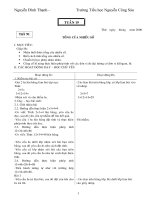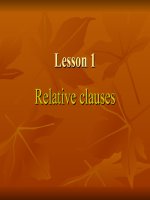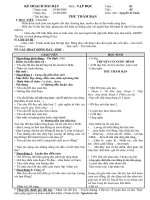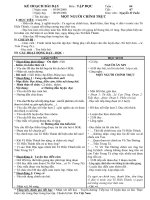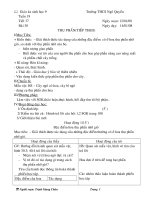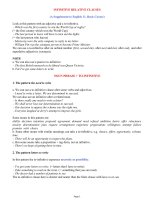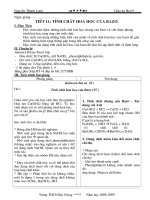Gián án REDUCED RELATIVE CLAUSES
Bạn đang xem bản rút gọn của tài liệu. Xem và tải ngay bản đầy đủ của tài liệu tại đây (92.65 KB, 3 trang )
REDUCED RELATIVE CLAUSES
1. They are followed by a prepositional phrase.
A. The man who is in the house likes to watch television all day.
The man in the house likes to watch television all day.
B. The books that are on the desk are mine.
The books on the desk are mine.
2. The main verb in the relative clause is progressive.
A. The man who is swimming in the lake is my father.
The man swimming in the lake is my father.
B. The clothes that are lying on the floor belong to me.
The clothes lying on the floor belong to me.
3. The main verb in the relative clause is passive.
A. The survey which was conducted by the government did not indicate true public opinion.
The survey conducted by the government did not indicate true public opinion.
B. The food that was eaten by the mice was poisonous.
The food eaten by the mice was poisonous.
REDUCED NON-DEFINING RELATIVE CLAUSES
Relative [=adjective] clauses
Necessary [=defining; restrictive] clauses
Unnecessary [=non-defining]
There are two different points which should not be confused:
1) Omitting just the relative pronoun if possible
2) Reduction of relative clauses if possible. Of course, here relative pronoun will be omitted as well
as some changes on the verb within the relative clause.
Concerning the first point, you are absolutely right, because
“The relative pronoun can be omitted ONLY in necessary [defining] adjective [relative] clauses.”
Page 1
REDUCED RELATIVE CLAUSES
What is called “reduction” is something else. Here it is not limited to only defining relative clauses.
Of course, there are conditions for reducing relative clauses, whether defining or non-defining.
One grammar book explains as follows:
“An adjective clause can be reduced to an adjective phrase only if the clause (a) begins with who,
which, or that as the subject of the clause and (b) contains a be form of the verb. … If there is no be
form of the verb, it is often possible to omit the relative pronoun and change the verb to its –ing form
[present participle].”
You see there is no mention of limiting it to only defining clauses. On the section about reduction of
full adjective clauses into adjective phrases, that grammar book goes on with this clarifying point,
with a warning about preserving the original punctuation:
“If the adjective clause needs commas [i.e. non-defining], the adjective phrase also needs commas.”
Then these examples are offered:
“Adjective clause: You can get your passport renewed at the Kennedy Building, which is located
near the train station.
Adjective phrase: You can get your passport renewed at the Kennedy Building, located near the train
station.”
Adjective clause: These articles, which were written several years ago, have been published in
several popular magazines.
Adjective phrase: These articles, written several years ago, have been published in several popular
magazines.
Undoubtedly, the examples above are non-defining clauses which have those acceptable reduced
forms.
A related kind but with different name is appositive phrases:
“Some adjective clauses can be reduced to appositive phrases. An appositive phrase is a noun or
pronoun with modifiers that is placed after another noun or pronoun to explain it.
Adjective clause: History, which is my favorite subject, has always fascinated me.
Appositive phrase: History, my favorite subject, has always fascinated me.
Because an appositive phrase adds only extra, unnecessary information, it is always set off from the
rest of the sentence by commas.”
Clearly, appositive phrases are instances of non-defining relative clauses which are reduced with the
same sets of rules.
Page 2
REDUCED RELATIVE CLAUSES
SOME OTHER USES:
The person writing reports is my colleague.
The above sentence may be interpreted, according to the context, as equivalent to one of the more
explicit versions in the following.
1. The person who will write reports is my colleague.
2. The person who will be writing reports is my colleague.
3. The person who writes reports is my colleague.
4. The person who is writing reports is my colleague.
5. The person who wrote reports is my colleague.
6. The person who was writing reports is my colleague.
A Comprehensive Grammar of the English Language, Quirk, et al.
However, according to Michael Swan, we should use a relative clause to express a non-progressive
meaning.
7. The man who threw the bomb was arrested.
NOT 8. *The man throwing the bomb was arrested.
If Quirk is right, sentence #8 should be acceptable, shouldn't it?
If Swan is right, the underlined sentence cannot normally be interpreted as 1, 3, or 5.
Who do you think is right, Quirk or Swan?
Page 3
